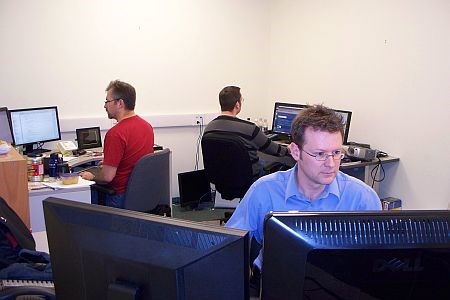Dwayne Hammond wants to bring a video game designer's mentality toward creating a new therapists' tool that helps stroke victims recover their speech.
As a former designer of console and mobile gaming products for some major publishers, he is spearheading Algoma University's vision to create a whole new genre of games in Sault Ste. Marie.
Hammond, who is the university's strategic advisor of computer games technology, knows this is a real departure from "making toys" to developing health-care products.
"That's what is really exciting about it. I'm not making the next game to amuse somebody ... I'm working on games that help somebody."
Algoma University has established a video game development studio specializing in leading edge health care research. It's housed in the Sault Ste. Marie Innovation Centre on the Queen Street campus.
The speech therapy game is the flagship project of Algoma Games for Health where Hammond and a team of three developers are fine-tuning a working prototype in partnership with Toronto Rehabilitation Institute (Toronto Rehab). They hope to showcase their project to the medical community soon.
In industry parlance, it's called video game enhanced telepractice solutions.
The team is collaborating with the academic hospital to come up with a web-based delivery system that not only assists stroke victims, but allows therapists and researchers to track and monitor a patient's progress by recording audio and video data.

A screenshot of one of Hammond's "serious games."
"It's valuable for your therapy to review how your lips move when you pronounce a word."
Hammond said the flash card game used by therapists – a teaching tool used to improve speech – "really jumped out" and had the most rudimentary potential to be converted into a video game.
"At the heart of it, it's a means for two people to get together and share content."
The final version won't look like Grand Theft Auto, but it should make therapy more enjoyable.
Hammond said it's important to entertain people while shepherding them through the tedious process of rehabilitation. The game should have particular value for stroke victims in distant communities where there is infrequent one-on-one contact with a therapist.
"I have no doubt what we're doing will make therapy a lot more entertaining from the user's perspective," said Hammond.
Producing health-care games seemed like a good fit and a teaching platform for studio staff and the university in specializing in a subfield of gaming known as "serious games" (games for non-entertainment purposes).
The Algoma Games for Health studio has the capacity to grow to 24 employees when the entire Innovation Centre staff moves next year into the new $16-million Biosciences and Technlogy Convergence Centre.
"That's really cool and exciting," said Hammond, who trained to be an architect before getting into the game development world. He was a designer with major and independent companies such as Gameloft, one of the world's largest mobile game studios.
Going from designing award-winning games like Derek Jeter 3D Baseball to spearheading cutting-edge health care technologies was a once-in-a-lifetime opportunity he couldn't turn down.
Hammond came to the Sault in late 2007 to help create a new gaming technology culture and build a talent pool of home-grown game developers.
He brings an entrepreneurial bend to Algoma University's masters of science in computer games with the bold vision of creating a commercial cluster of video game start-up companies.
"Coming here and trying to start up a whole new industry that helps hundreds of people, it's a more unique and a once-in-a-lifetime opportunity."
The speech therapy game had been in the concept stage for a year and a half and has become a full-time endeavor for the studio since November.
Although the studio is a non-profit entity, Hammond is hoping the speech therapy game will be the first of a slate of health-related product they can take to market.
"We'll see where it goes and grows," said Hammond.
The market potential for these kind of serious games is only just emerging, but it is potentially worth billions of dollars.
"I'm used to making high-end products that entertain. I want to bring the absolute best development practices and top-of-the-line talent to serious games and be able to create polished quality products."
Hammond said his team is "very close" to showcasing it as a prototype.
"At the end of the day we're still making games, we're still amusing people, that's one of the values we bring into therapy, that it will be more entertaining."
www.mastersingaming.com
www.algomau.ca




